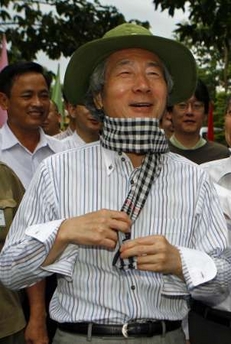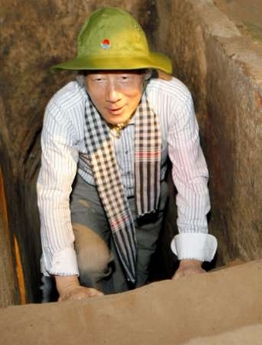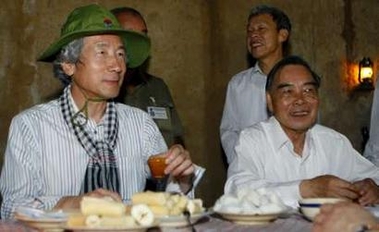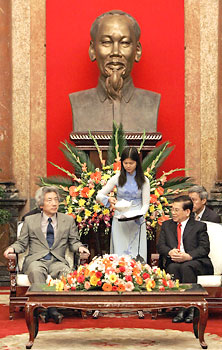I was pretty surprised and fascinated by a BBC mention last week of KMT soldiers who had fled to Southeast Asia instead of Taiwan, and turned to banditry and drug trafficking instead of soldiery. In an excellent coincidence, the Taipei Times ran an article on Saturday’s issue on just this subject.
Descendants of KMT soldiers living in limbo
ON THE MARGINS: The offspring of former KMT soldiers who fled China are finding that while they are welcome to study in Taiwan, they may not be able to reside here
By Loa Iok-sin
STAFF REPORTER
Saturday, Nov 03, 2007, Page 2 “Stateless” descendants of former Chinese Nationalist Party (KMT) troops stationed in northern Myanmar and Thailand yesterday pleaded with the government to naturalize them.
Tens of thousands of KMT troops retreated across the Chinese border and stationed themselves in northern Myanmar and Thailand following the defeat of Chiang Kai-shek’s (蔣介石) Nationalist forces by the Communists in the Chinese Civil War.
As the push to retake China never took place, many of the soldiers and their families were stranded in the region.
Since these people entered Myanmar and Thailand illegally, they are not recognized by the two countries. Their descendants have thus been denied citizenship, although many of them were born and raised in these countries.
Some of these stateless people faced a new challenge after coming to Taiwan to attend college.
Chen Chai-yi (陳彩怡), from northern Myanmar, told her story during a press conference held at the legislature yesterday.
“I passed the college entrance exam held by Taiwan’s Overseas Compatriot Affairs Commission [OCAC] and was accepted by a university in Taiwan in 2003,” Chen said.
However, since she had no citizenship from either country, Chen purchased a forged Burmese passport to travel with, she said.
It was only once Chen arrived in the country that she discovered she would be required to prove her status before receiving Taiwanese citizenship.
“I wasn’t aware of this and the OCAC didn’t tell me when I took the exam [in Myanmar],” Chen said.
“I cannot return to Myanmar because I will be imprisoned for life for holding a forged passport, but my stay in Taiwan will also become illegal once I graduate from college,” Chen said. “I’m basically stuck.”
Liu Hsiao-hua (劉小華), chief executive of the Thai-Myanmar Region Chinese Offspring Refugee Service Association, estimated that more than 1,000 students from the region are in a similar situation.
Lee Lin-feng (李臨鳳), an Immigration Bureau official, said that there are difficulties involved in granting these people citizenship.
“What has blocked these people from obtaining Taiwanese citizenship is that neither they nor the Ministry of National Defense have any proof that they are descendants of former soldiers,” Lee said. “Even when some had proof, they were unable to submit a certificate renouncing their original nationality.”
Lee said she would seek a solution at the next Ministry of the Interior meeting, “considering the special circumstances.”
I’m rather surprised that these former KMT soldiers and their descendants have remained stateless for so long. It is hardly expected that Burma or Thailand would have granted them citizenship. Although both countries do have communities of Chinese citizens, they would hardly have put escaping soldiers and criminals in the same category as immigrant merchants. The article does explain that “these people [do not] have any proof that they are descendants of former soldiers,” but I have yet to see any reason for why the KMT remnant in SE Asia never rejoined their main force on Taiwan, once it was clear that they were well established there, and the threat of invasion from the mainland began to recede.
The article mentions the Overseas Compatriot Affairs Commission [OCAC] (see their official English language website here,) which handles documentation and residency for overseas Chinese citizens (Overseas Compatriot.) While in a strict technical sense, Republic Of China citizenship theoretically extends to all of China, as the ROC is constitutionally the government of China, but as the ROC itself has shrunk to include what may someday be called merely the Republic Of Taiwan, ROC citizenship today more or less means Taiwanese citizenship, and in practice excludes any citizen of the People’s Republic of China.
While I do not have time at the moment to examine it in detail, the OCAC provides rules on Overseas Compatriot status, as well as rules for applying to study in Taiwan through the OCAC, using the process referred to in the above article.
Another mention of the KMT remnant turned criminal in SE Asia comes from a surprising source- the subject of the new Denzel Washington film American Gangster, the famous real-life New York based drug dealer Frank Lucas. The following text is from an interview article in New York Magazine:
Lucas soon located his main overseas connection, an English-speaking, Rolls-Royce-driving Chinese gentleman who went by the sobriquet 007. “I called him 007 because he was a fucking Chinese James Bond.” Double-oh Seven took Lucas upcountry, to the Golden Triangle, the heavily jungled, poppy-growing area where Thailand, Burma, and Laos come together.
“It wasn’t too bad, getting up there,” says Lucas. “We was in trucks, in boats. I might have been on every damn river in the Golden Triangle. When we got up there, you couldn’t believe it. They’ve got fields the size of Tucson, Arizona, with nothing but poppy seeds in them. There’s caves in the mountains so big you could set this building in them, which is where they do the processing . . . I’d sit there, watch these Chinese paramilitary guys come out of the mist on the green hills. When they saw me, they stopped dead. They’d never seen a black man before.”
Likely dealing with remnants of Chiang Kai-shek’s defeated Kuomintang army, Lucas purchased 132 kilos that first trip. At $4,200 per unit, compared with the $50,000 that Mafia dealers charged Stateside competitors, it would turn out to be an unbelievable bonanza. But the journey was not without problems.
“Right off, guys were stepping on little green snakes, dying on the spot. Then guess what happened? Banditos! Those motherfuckers came right out of the trees. Trying to steal our shit. The guys I was with — 007’s guys — all of them was Bruce Lees. Those sonofabitches were good. They fought like hell.
“I was stuck under a log firing my piece. Guys were dropping. You see a lot of dead shit in there, man, like a month and a half of nightmares. I think I ate a damn dog. I was in bad shape, crazy with fever. Then people were talking about tigers. I figured, that does it. I’m gonna be ripped up by a tiger in this damn jungle. What a fucking epitaph . . . But we got back alive. Lost half my dope, but I was still alive.”
(Via the Fighting 44s blog, pointed out by my friend Jon Lung.)
Tangential end-note: searching for “military remnant” on Google produced an article on the remnant of the Galactic Empire in Star Wars, following the end of Return of the Jedi.





